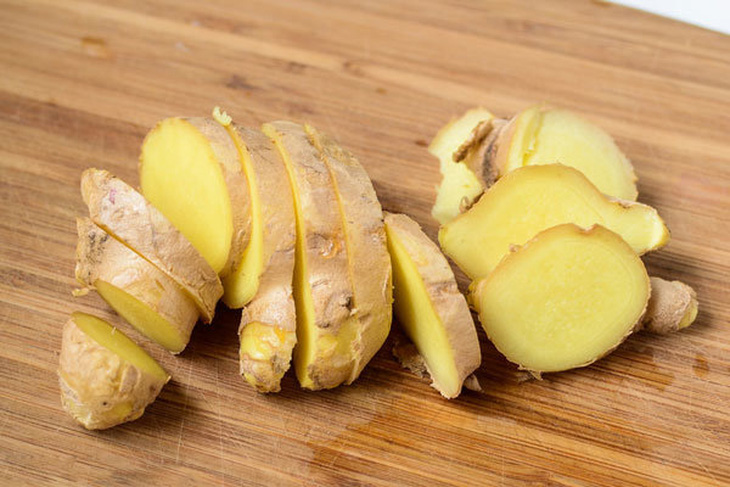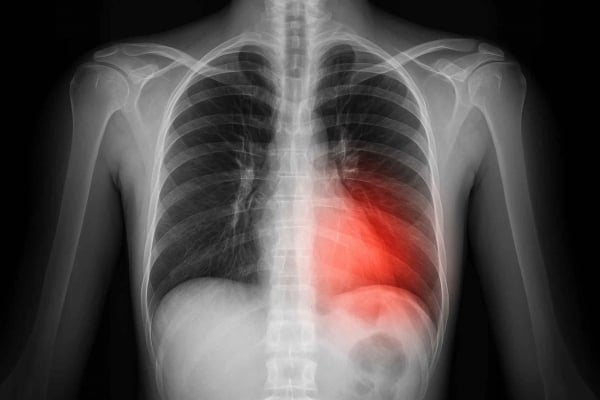
Ginger has been used to relieve bloating and flatulence, as well as treat nervous system disorders - Photo: Getty
Cultures around the world have used ginger for thousands of years to treat a variety of ailments, including aches and pains, nausea, colds, and headaches. Ginger has also been used to relieve gas and bloating, as well as treat nervous system disorders.
With its antibacterial, anti-inflammatory, and possibly cancer-preventing properties, ginger has been studied for its effects on digestive disorders, arthritis, cancer, and factors related to cardiovascular health. Ginger’s anti-nausea effects may be beneficial during pregnancy, motion sickness, and after anesthesia.
While specific research on ginger juice is limited, many studies have demonstrated the potential for general health benefits of ginger root, so it's likely that the concentrated juice will provide similar benefits, according to Health .
Ginger is rich in antioxidants
Ginger contains many biological compounds that contribute to beneficial effects on the body's health.
For example, antioxidants are biological compounds that help neutralize harmful compounds called free radicals, preventing oxidative stress and disease-causing cell damage.
Relieves muscle and joint pain
Ginger is well known for its anti-inflammatory properties, mainly due to the compounds gingerol and shogaol, which can block inflammatory pathways in the body. Excessive inflammation can lead to pain.
Clinical trials have shown that ginger can help reduce muscle pain after exercise. Consuming 2 grams of fresh or heat-treated ginger per day can reduce muscle inflammation, while supplementing with 4 grams of ginger can speed up muscle recovery after intense exercise.
Other studies show that ginger may help reduce symptoms of arthritis, which are often made worse by inflammation.
Relieve digestive discomfort
Ginger can help relieve digestive discomfort. Once consumed, ginger and its components work in the digestive tract to soothe the digestive organs, stimulate stomach contractions, promote gastric emptying, and enhance intestinal motility.
These effects may help reduce symptoms such as bloating, abdominal pain, and nausea, often associated with delayed gastric emptying and functional dyspepsia.
In a study of 51 patients with functional dyspepsia, participants took two ginger supplements daily (one before lunch and one before dinner) at a dose of 540 mg for four weeks.
They had significant improvements in symptoms such as bloating after eating, abdominal pain and burning, and heartburn. Ginger may also help reduce symptoms of gastroesophageal reflux disease (GERD).
Improve blood flow
Ginger, specifically the compound 6-gingerol, has been studied for its effects on blood pressure. Research suggests that ginger may play a role in improving vasodilation and regulating sodium levels. However, more clinical studies are needed to confirm these findings.
Researchers say that high doses of ginger supplementation (2, 4, and 6 grams per day) may provide benefits related to blood circulation and heart health.
Supports healthy blood sugar levels
Ginger may play a role in blood sugar control, thereby stabilizing energy levels and preventing complications related to diabetes and heart disease.
Clinical trials have shown that ginger may help control blood sugar in people with type 2 diabetes. Daily ginger supplementation (1–3 grams per day) for several weeks has been shown to improve fasting blood sugar and HbA1c levels (a measure of blood sugar control). Some studies have also shown a reduction in triglycerides and total cholesterol.
Improve cholesterol levels
Daily ginger supplementation may be beneficial in managing cholesterol levels. Maintaining healthy cholesterol levels is a factor that can reduce the risk of heart disease.
A clinical trial in obese women with breast tumors found that daily ginger supplementation along with water exercise may improve cholesterol levels.
Results suggest that ginger supplementation may be associated with reduced low-density lipoprotein (LDL) cholesterol and triglyceride levels, while increasing high-density lipoprotein (HDL) cholesterol levels.
According to the Mount Sinai Health System, people with gallstones should talk to their doctor before taking ginger. Also, tell your doctor if you are taking ginger before surgery or anesthesia. Pregnant or nursing women, people with heart disease, and people with diabetes should also not take ginger without talking to their doctor.
In particular, don't use ginger if you have a bleeding disorder or if you're taking blood-thinning medications, including aspirin.
 Ginger is good but some people find it poisonous, why?
Ginger is good but some people find it poisonous, why?Source: https://tuoitre.vn/dung-dung-cach-gung-mang-lai-nhung-ich-loi-gi-20240917154057622.htm





























![[Photo] "Beauties" participate in the parade rehearsal at Bien Hoa airport](https://vstatic.vietnam.vn/vietnam/resource/IMAGE/2025/4/11/155502af3384431e918de0e2e585d13a)






























































Comment (0)